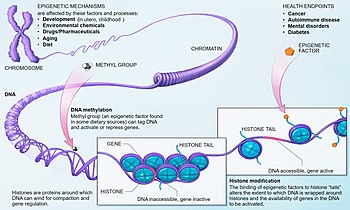I’ve written about my pain threshold before. Where I’ve obtained (now, there’s a verb choice) 3rd degree burns all over my arm and kept on working. Or, broken my leg and kept on going. Well, it turns out that we can train our genes to provide this benefit.
(Actually, it is NOT a benefit- because pain serves as a warning to us. To remind us to stop what we are doing and keep ourselves safe.)
It turns out our diet, whether we smoke, drink, or bask in pollution all affect our genes. These changes are called epigenetic changes (environmentally triggered chemical changes to our genes). And, now we have evidence that this may affect our pain thresholds.
Drs. Tim Spector and J. Wang (King’s College, London) [with a large group of researchers- Drs. J. Bell, A. Loomis, L. Butcher, F. Gao, B. Zhang, C. Hyde, J. Sun, H. Wu, K. Ward, J. Harris, S. Scollne, M. Davies, L. Schalkwyk, J. Mill, F. Williams, N. Li, P. Deloukas, S. Beck, and S. McMahon] studied identical twins for the presence of epigenetic changes. They determined that methylation (the addition of one or more methyl groups) of our genes affects our pain threshold. The results were published in Nature Communications.

First, the research group examined hundreds of identical twins to determine their response to a standard pain test (withstand a laser’s heat on one’s skin). From this universe, they selected the 25 pairs who demonstrated the most variance between the twin pairs in the highest temperature they could bear. Given that they were identical twins, they should have identical genes; the only differences should be epigenetic.
They then examined 10 million genetic regions, seeking out any methylation changes. And, they did find them- in nine genes, the same ones implicated as pain sensitive in animal experiments. One of the largest differentiators was the TrypA1 promoter gene; this gene governs the ion channel on nerve cells. A 10% increase in methylation correlated with a 2 degree temperature drop in the heat-pain threshold.
The results were duplicated when they examined 50 unrelated subjects- those with the most differential in methylation on the nine genes provided the most differences in the pain threshold.
This sort of screening is hoped to the development of better painkillers or even new approaches to the issue of pain.








Thank goodness for identical twins!
Carolina HeartStrings recently posted..CROCK POT SODA CAKE
Nice to know it’s not all in the head like some doctors used to tell me.
Ann Mullen recently posted..(Article Under Construction) Suddenly Poor–The Great Recession, Foreclosure, Poverty
Well, maybe… 🙂
Seriously, though, pain is one of those ailments that only the patient can describe, Ann.
So, Roy, do you think that we will be able to explain why my husband is always in more pain than the rest of the world? For some reasons things are always more serious and painful for him than for the rest of us. He doesn’t have a cold. No, it is flu. Do you really think it could be the genes?
Muriel recently posted..Sarah Moon Is In London
I have no idea what the “man flu” is, Muriel…
But, we each feel pain (or not) differently. (I, for one, seem to not feel it enough..)
For years, there has been a controversy over “fibromyalgia”- is it a true medical condition or a psychological one…
Do you think that this could be the explanation for man flu? http://t.co/E0CZRiBcsn via @Adjuvancy
#pain threshold
I like http://t.co/lujH3wGipl
Your posts are always so fascinating. Thank you
Carol Tomany recently posted..Qualifications….
Thanks, Carol. I’m glad you enjoyed the discussion of new choices in pain studies.
pain control…http://t.co/iwxm5fnBTt
…pain is the pits…
Caro Ness recently posted..A Dog Day